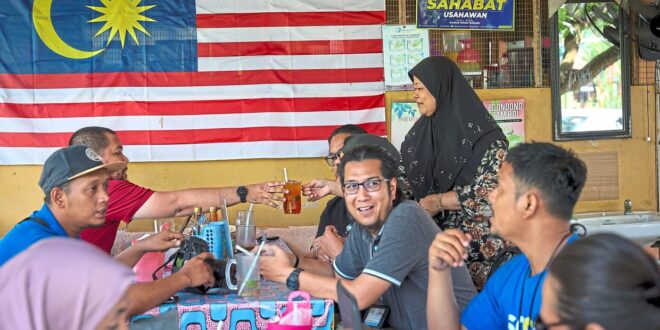HULU SELANGOR: Party workers are working as hard as they can to persuade voters in Kuala Kubu Baru, especially outstation voters, to return home and carry out their responsibility.
With just a day left before polling day tomorrow, the workers have visited houses, sent out messages on social media and made appeals at their party ceramah asking every registered voter to cast their ballot.
Unity government’s Kuala Kubu Baharu seat campaign manager Wayne Ong said election workers have created video clips calling on outstation voters to return.
They have also enlisted the help of elderly voters to urge their children to come back and vote tomorrow.
“During our walkabouts, many parents told us that they will encourage their children to come back to vote.
“And coincidentally, Mother’s Day is on Sunday.
“At this point, we can’t predict how many outstation voters will be willing to return, but we have done all we can to reach out to them,” he said.
Ong insisted that this by-election is not about the Chinese electorate as the unity government needs voters from all ethnic backgrounds to cast their ballots.
“We’re hoping for a voter turnout exceeding 70%, as this would be crucial for a victory,” he added.
Gerakan treasurer Hng Chee Wey said that the party is encouraging outstation voters to return and vote, adding that a voter turnout of 80% would benefit Perikatan Nasional.
Hng noted that a low voter turnout is typical for any by-election, especially when this by-election does not involve a change in government.
“In this scenario, some voters may feel that it’s not necessary to return to vote,” he added.
According to an analyst, the voter turnout rate there has been consistently high in each general election over a decade ago.
It even peaked at over 85% turnout in the 2013 elections.
However, he believes the voter turnout rate tomorrow is expected to be lower than before.
Universiti Teknologi Malaysia’s Razak Faculty Perdana Centre political analyst Dr Mazlan Ali said the decrease in voter turnout rate in 2018 and 2023, which were 84.9% and 68.67% respectively, was due to the hike in the number of voters brought about by the automatic registration of voters in 2022.
“Actually, the turnout percentage for 2018 and 2023 was relatively the same,” he said in an interview.
Mazlan is predicting the voter turnout rate to be between 55% and 65%.
He believes that many outside voters will not return to vote, especially those in Johor and Singapore.
“They may also think that this election will not change anything,” he said.
He said it is imperative for the parties to convince outstation voters to return and cast their votes.
“The parties should provide transportation for them,” he added.
During the state polls last year, the voter turnout rate in Kuala Kubu Baharu was 68.27%.
In the 2018 general election, 84.9% of its electorate cast their ballots in the seat.
The constituency consists of 46.91% Malays, Chinese (30.28%), Indians (17.79%) and others (5.02%).
Analysts have said the turnout of each race could tilt the scales in the by-election where campaigns are mostly targeted towards each ethnic group.
Political analyst Lau Zhe Wei said there is no indication that the outstation Chinese voters will return to vote.
“If the Chinese voter turnout is 5% to 10% lower than Malay voters, DAP will likely lose,” he added.
Lau said Malay votes will be crucial in the by-election. He said Pakatan Harapan candidate Pang Sock Tao is gaining a lot of support among Umno grassroots.
“But it is uncertain whether Umno can help get the votes. As long as Umno can help to gain 30% of the Malay votes, that will be sufficient.
“A 20% rate of Chinese votes is still possible to help DAP retain the seat,” he said.
However, Lau cautioned that if Umno garners less than 15% of the Malay votes, DAP could lose the seat.
There are 40,226 registered voters in Kuala Kubu Baharu, of which 238 are soldiers and 526 police personnel.
 BeritaKini.biz Berita Viral Terkini di Malaysia
BeritaKini.biz Berita Viral Terkini di Malaysia





